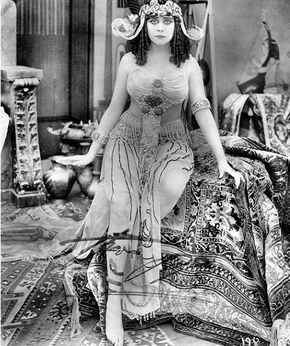
Last week Maureen Dowd presented a BBC Radio 4 documentary, The Smart Dumb Blonde focusing mainly on Marilyn Monroe's quest to improve her intellectual ability. Dowd mourned Hollywood's disposal of intellectualism in favour of peroxide and discussed with Harvey Weinstein how the stars of Old Hollywood found fame thanks to their quirks, as opposed to simply fitting the ready-made mould.
On the 127th anniversary (+1 day, I know, my hands are tied by our week day timetable) of Theda Bara's birth I would like to mourn the passing of languid sexuality in favour of dead-behind-the-eyes-sexy. Think of any on a current starlet on a chaise-longue and you think: 'ah, too many Vicodin pills'. Think of Theda Bara reclining on a chaise-longue you think: 'ah, glamorously exhausted'.
Theda Bara created The Vamp, or vamping style in silent films such as Salome, Cleopatra and When a Woman Sins. Wearing (or rather placing upon her body) costumes so brief they'd make Britney blush and emphasising her flashing eyes with thick black kohl Bara vamped her way to being one of the highest paid women in Hollywood, her only rival the sickly sweet (though the girlish act hid a steely shrewdness) Mary Pickford. Family fare Bara was not.
Bara's 1915 drama A Fool There Was truly launched her career as the go-to Vamp. Inspired by Rudyard Kipling's poem The Vampire the plot involved Bara, credited as The Vampire, who seduces and corrupts the moral Wall Street lawyer John Schuyler. The film was considered to be incredibly risqué, the line that became its catchphrase: “Kiss me, my fool!” made Theda Bara the ultimate femme fatale.
The studio, anxious to capitalise on the creation of Theda Bara, provided Bara's exotic and entirely fictional biography as an Arabian actress in furs. Her stage name, an anagram of Arab death fuelled the femme fatale image. When promoting Cleopatra in 1917 Bara's biography changed again, now she was born in the shadow of the Sphinx to a French actress and Italian sculptor and nicknamed The Serpent of the Nile. Under the instruction of the studio Bara discussed mysticism and the occult in interviews.
By the 1920s Bara's fame was on the wane and in 1921 she married the American film director Charles Brabin. They honeymooned not in any exotic climes of Theda Bara's alleged past but in the disappointingly ordinary Nova Scotia. The couple had no children.
In 1955 Bara died of stomach cancer. Much of her back catalogue is believed to be lost or destroyed, only a few inches of her film Cleopatra survived a fire in Fox film studios. She was never filmed in sound and so remains a silent film star.
Squeamish Kate

 RSS Feed
RSS Feed
